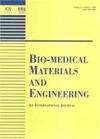Customized design and biomechanical property analysis of 3D-printed tantalum intervertebral cages
IF 1.3
4区 医学
Q4 ENGINEERING, BIOMEDICAL
引用次数: 0
Abstract
BACKGROUND:Intervertebral cages used in clinical applications were often general products with standard specifications, which were challenging to match with the cervical vertebra and prone to cause stress shielding and subsidence. OBJECTIVE:To design and fabricate customized tantalum (Ta) intervertebral fusion cages that meets the biomechanical requirements of the cervical segment. METHODS:The lattice intervertebral cages were customized designed and fabricated by the selective laser melting. The joint and muscle forces of the cervical segment under different movements were analyzed using reverse dynamics method. The stress characteristics of cage, plate, screws and vertebral endplate were analyzed by finite element analysis. The fluid flow behaviors and permeability of three lattice structures were simulated by computational fluid dynamics. Compression tests were executed to investigate the biomechanical properties of the cages. RESULTS:Compared with the solid cages, the lattice-filled structures significantly reduced the stress of cages and anterior fixation system. In comparison to the octahedroid and quaddiametral lattice-filled cages, the bitriangle lattice-filled cage had a lower stress shielding rate, higher permeability, and superior subsidence resistance ability. CONCLUSION:The inverse dynamics simulation combined with finite element analysis is an effective method to investigate the biomechanical properties of the cervical vertebra during movements.3D 打印钽椎间笼的定制设计和生物力学特性分析
背景:临床应用中使用的椎间融合保持架通常是标准规格的普通产品,与颈椎匹配具有挑战性,容易造成应力屏蔽和下沉。目的:设计和制造符合颈椎段生物力学要求的定制钽(Ta)椎间融合保持架。方法:通过选择性激光熔化技术设计并制造出定制的钽(Ta)椎间融合保持架。采用反向动力学方法分析了不同运动下颈椎节段的关节力和肌肉力。采用有限元分析方法分析了椎体笼、椎板、螺钉和椎体终板的应力特性。通过计算流体动力学模拟了三种晶格结构的流体流动行为和渗透性。通过压缩试验研究了椎体保持架的生物力学特性。结果:与实心保持架相比,格状填充结构大大降低了保持架和前固定系统的应力。与八面体和四面体格状填充保持架相比,位三角形格状填充保持架的应力屏蔽率更低,渗透性更高,抗下沉能力更强。结论:反动力学模拟结合有限元分析是研究颈椎运动时生物力学特性的有效方法。
本文章由计算机程序翻译,如有差异,请以英文原文为准。
求助全文
约1分钟内获得全文
求助全文
来源期刊

Bio-medical materials and engineering
工程技术-材料科学:生物材料
CiteScore
1.80
自引率
0.00%
发文量
73
审稿时长
6 months
期刊介绍:
The aim of Bio-Medical Materials and Engineering is to promote the welfare of humans and to help them keep healthy. This international journal is an interdisciplinary journal that publishes original research papers, review articles and brief notes on materials and engineering for biological and medical systems. Articles in this peer-reviewed journal cover a wide range of topics, including, but not limited to: Engineering as applied to improving diagnosis, therapy, and prevention of disease and injury, and better substitutes for damaged or disabled human organs; Studies of biomaterial interactions with the human body, bio-compatibility, interfacial and interaction problems; Biomechanical behavior under biological and/or medical conditions; Mechanical and biological properties of membrane biomaterials; Cellular and tissue engineering, physiological, biophysical, biochemical bioengineering aspects; Implant failure fields and degradation of implants. Biomimetics engineering and materials including system analysis as supporter for aged people and as rehabilitation; Bioengineering and materials technology as applied to the decontamination against environmental problems; Biosensors, bioreactors, bioprocess instrumentation and control system; Application to food engineering; Standardization problems on biomaterials and related products; Assessment of reliability and safety of biomedical materials and man-machine systems; and Product liability of biomaterials and related products.
 求助内容:
求助内容: 应助结果提醒方式:
应助结果提醒方式:


